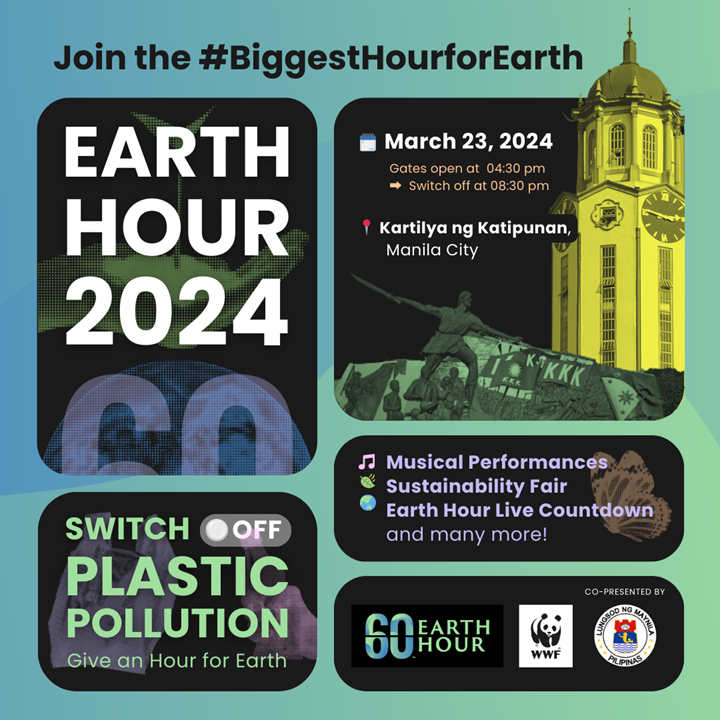
Filipinos can help solve two of our planet’s biggest problems, biodiversity loss, and climate change, by doing their part in conserving energy and putting an end to the problem of plastic pollution.
Earth Hour 2024, set on March 23, Saturday will once again bring together millions of people across the world so they can all give an hour for Earth and play a role in protecting nature. The local observance of Earth Hour, led by WWF-Philippines, will be held at the Kartilya ng Katipunan, beside the Manila City Hall.
“Too many of us have forgotten that we are deeply connected with nature, but the way we live, the way we produce and consume, the way we create the spaces we live – all have made a tremendous impact on our environment, on biodiversity,” WWF-Philippines Executive Director Katherine Custodio said during the media launch of Earth Hour 2024. “We need to remember a simple message that humans will be ok only if nature, our planet is ok.”
“This year Earth Hour Philippines’ focus is on addressing plastic pollution as it is one of the most pressing concerns for our country and a public health issue. We generate 2 million tonnes of plastic waste in the Philippines every year, only 9% is recycled, and 35% leaks out into the open environment. As we are an archipelago of 7,640 islands, the damage caused by plastic pollution to our environment is magnified,” Custodio said.
The Manila City Local Government is the main partner for this year and several iconic landmarks in the city, including the city hall clock tower and Rizal Monument, will switch off their lights for one hour from 8:30pm to 9:30pm to express their commitment and solidarity to the cause of protecting the and restoring the environment.
Across the Philippines, national landmarks, office buildings, government offices, and homes will switch off their lights as a sign of their commitment towards addressing our planet’s sustainability.
The Earth Hour global celebration started as a symbolic event in Sydney, Australia in 2007 and has grown into one of the world’s largest grassroots environmental movements spanning over 7,000 cities and 193 countries and territories.
The Philippines joined in 2008, making Earth Hour 2024 the sixteenth time the celebration is observed. From a symbolic lights off event, Earth Hour has evolved into a movement that not only shines light on the issue of climate change but also on the importance of protecting the environment in order to address the challenge of climate change.
“Manila is honored to be hosting this year’s Earth Hour celebration, especially with this year’s focus on eradicating plastic pollution,” said Manila City Mayor Honey Lacuna-Pangan. “As the country’s capital, we’re keen on using the influence we have in engaging other cities and Filipinos to do their part in saving the environment.”
The most recent scientific studies have found that the planet’s deteriorating biodiversity and the fast changing climate are the two biggest challenges humanity confronts. There is a need to act quickly and decisively with new policies and systemic changes that promote renewable energy, transition to a circular economy, improving sustainable agriculture and fisheries, and increasing habitat restoration efforts. Plastics that end up in the ocean are recognized as affecting the ocean’s carbon absorption capacity as well and also becomes a risk factor for human health due to ingestion by fishing species.
“As one of the countries most vulnerable to the impacts of climate change, we need to ask ourselves how can we as Filipinos help save the planet by addressing our contribution to plastic pollution and we hope to use Earth Hour as the platform for awareness and actions,” WWF-Philippines National Director for Earth Hour Atty. Angela Ibay said.
“It is important that we galvanize ourselves so that we have a collective renewed commitment to the environment and we want to make ensure that people are the center of the solution,” Ibay
Out of all the generated solid waste in the Philippines, plastic waste is the third largest with 2,150,000 tonnes in 2019 alone. Unfortunately, only 9% of these plastics are recycled due to insufficient capacity to recycle the high-value plastics. WWF-Philippines partners with governments, cities, businesses, communities, civil-society organizations, the academe, and individuals in order to find and implement solutions to the plastics problem. Plastics are virtually at every level of human society and therefore requires everyone’s concerted efforts.
Custodio highlighted the partnership with Manila as partner in the fight against plastic pollution: “Manila signed up to be a Plastic Smart City, which means they commit to 100% reduction in plastic waste leakage by 2030.”
”Like many around the world, Manila City believes that plastics do not belong in nature. The city has formulated and is implementing a program of action against marine litter, and has an ordinance regulating the use of single-use plastics,” Custodio said.
Filipinos can also participate in Earth Hour this year by logging their hours of doing something positive for nature. They can log on to https://www.wwf.org.ph/our_work/earthhour/ and choose from several activities that they can do individually, with friends and even as a community. WWF-Philippines has developed a specialized local Hour Bank where individuals can see if there are local activities and events that they can participate in.

